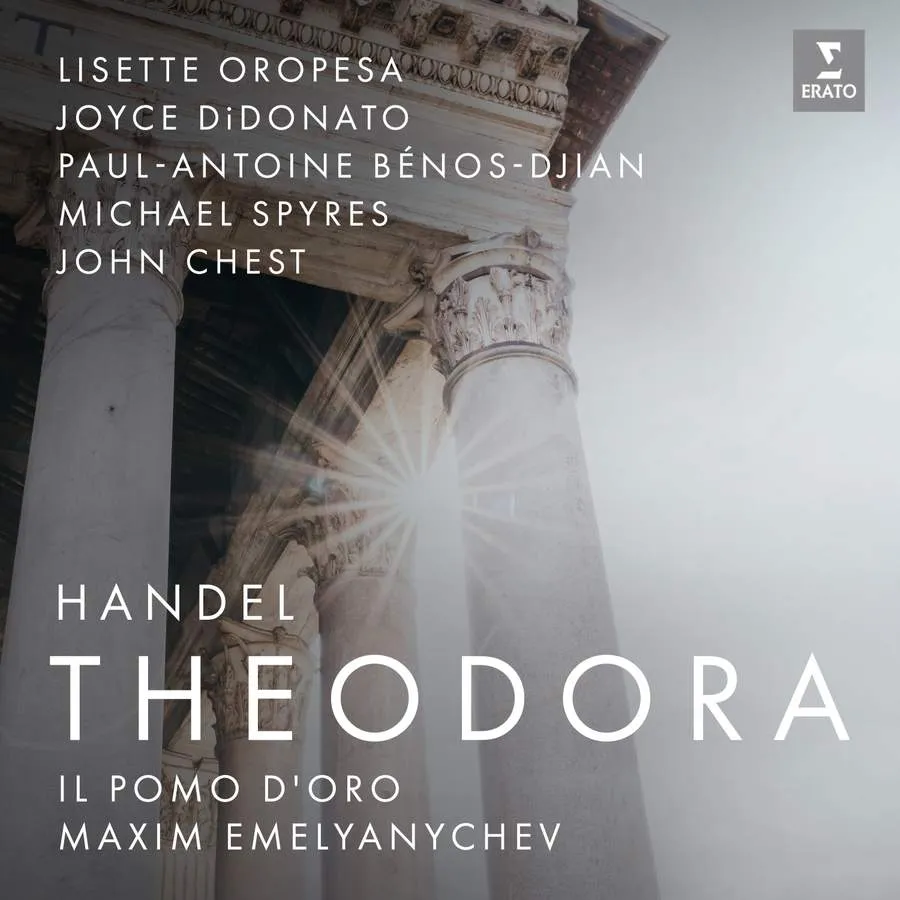
Handel Theodora Lisette Oropesa, Joyce DiDonato, Michael Spyres, John Chest et al ;Il Pomo d’Oro/Maxim Emelyanychev Erato 5419717791 178:08 mins (3 discs)
This is now the benchmark Theodora; it is optimally cast, dramatically intense and luminously beautiful. Its world-class principals use their fine vocal qualities to deepen their characters. With a precocious band and commanding chorus under Maxim Emelyanychev, the result is spellbinding.
Composing Theodora in 1749, Handel broke with the conventions he himself had embedded in English oratorio. Instead of Anglican uplift, the story dwells on a Catholic female martyr. Instead of individual display, solo and ensemble numbers serve overarching moods, most of which are sombre. Instead of sudden plot twists, the action follows a logic laid out at the start: at the order of ancient Alexandria’s Roman ruler, heroine Theodora is doomed to prostitution for holding with her Christian faith; the soldier Didymus, in love with Theodora, helps her escape, but both are caught and executed. Experimenting further, Handel gives the principals mostly reflective numbers, leaving the chorus, band and lesser characters to push the story forward.
Lisette Oropesa in the title role and Joyce DiDonato as her faithful friend Irene turn self-examination into dramatically riveting performances. Oropesa pours her rich, quicksilver voice into every detail. In her Act 1 aria ‘Fond, Flattr’ing World, Adieu’, she conveys the thudding of Theodora’s heart, rendered by Handel in harmonic rhythm, as lengthened downbeats. In her Act 2 aria ‘Oh, that I on wings could rise’, Oropesa’s soprano spirals gloriously upward as Emelyanychev quickens the music’s pulse, together turning Theodora’s despair into something like hope. DiDonato wholly subsumes her voice to the character of Irene, distilling her world-famous mezzo power into pure-toned whispering, as in her mesmerising ‘As with Rosy Steps the Morn’. In her last aria (‘New scenes of joy’), Handel has Irene make sense of grief, and DiDonato’s dignified simplicity is more moving than anything flashier could be.
Playing against these steely women is countertenor Paul-Antoine Bénos-Djian as Didymus, whose character develops from army underling to fearless hero. At a turning point for Didymus in his Act 1 aria ‘Kind Heav’n’, Bénos-Djian maximises the tension of sustained notes so that his impassioned vows to save Theodora gush forth as if impossible to restrain. Over three acts Bénos-Djian gradually softens the timbre of his lithe instrument until his voice melts with Theodora’s in their final duet, ‘To Thee, Thou Glorious Son of Worth’.
Emelyanychev and the band co-create these spellbinding effects. Big silences, the oneness between singer and solo player, and a soft-breathed continuo are typical of this recording’s deeply shared artistry. The second principals, baritone John Chest as evil Roman ruler Valens and tenor Michael Spyres as Didymus’s best mate Septimius, deliver fiery and technically flawless performances. The choir chillingly realises the violence at the core of this oratorio: representing at one moment orgiastic heathens and at the next devout Christians, Il Pomo d’Oro sounds like two unrelated vocal ensembles: one harsh, percussive and guttural; the other smooth, euphonic and sublime. Such heartfelt readings by all the artists involved make this Theodora truly definitive.
Berta Joncus
